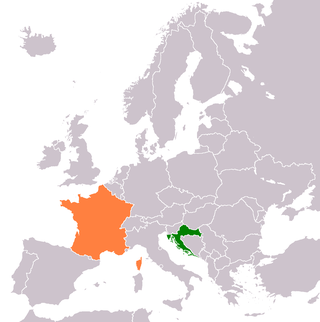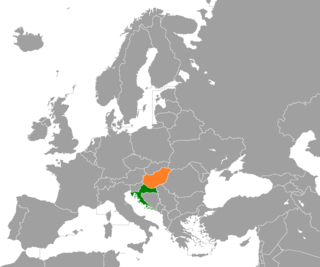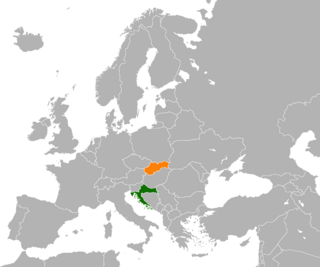 | |
Croatia | Japan |
|---|---|
Croatia and Japan maintain diplomatic relations through mutual embassies.
 | |
Croatia | Japan |
|---|---|
Croatia and Japan maintain diplomatic relations through mutual embassies.
The two countries established diplomatic relations with each other on March 5, 1993. The embassy of Croatia in Tokyo was founded in September 1993 while the Japanese embassy in Zagreb was founded in February 1998. [1]
During World War II, the Empire of Japan maintained an embassy in Zagreb and recognized the Independent State of Croatia, which was a puppet government of Nazi Germany; they were all part of the Axis powers. [2]

Croatia officially joined NATO on April 1, 2009. [3] Since the accession to the military alliance, Croatia and Japan share the same ally, the United States. [4]
A training ship of the Japan Maritime Self-Defense Force (JMSDF) JDS Kashima visited to Split, the second-largest city in Croatia for celebrating 20th anniversary of diplomatic relations between both countries in September 2013. [5] This is the first visit ever to Croatia by a Japanese naval vessel. [6] A party for fellowship which includes joint performance by JMSDF Band and Croatian Navy Band was held aboard Kashima anchored in a port of Split, and Former Croatian President Stjepan Mesić, Japanese Ambassador Masaru Tsuji, JMSDF Rear Admiral Fumiyuki Kitagawa, dozens of militaries of both navies and general citizens were attended. [7]
The foreign relations of Croatia is primarily formulated and executed via its government which guides the state's interactions with other nations, their citizens, and foreign organizations. Active in global affairs since the 9th century, modern Croatian diplomacy is considered to have formed following their independence from Yugoslavia in 1991. As an independent state, Croatia established diplomatic relations with most world nations – 187 states in total – during the 1990s, starting with Germany (1991) and ending most recently with Togo (2023). Croatia has friendly relations with most of its neighboring countries, namely Slovenia, Hungary, Montenegro, and Italy. They maintain colder, more tense relations with Serbia as well as Bosnia and Herzegovina due to historic nation-building conflict and differing political ideologies.

The foreign, diplomatic, economic, and political relations between Croatia and the United States were established on April 7, 1992 following the dissolution of Yugoslavia. After Croatia's debut as an independent state in 1996, the U.S. established the country as its most important political connection to Southeast Europe. Modern relations are considered to be warm and friendly, with stalwart bilateral collaboration. The Croatian diaspora in the U.S. is estimated to be around 500,000 which, in part, informs the foreign policy of Croatia. The two nations have strong connectivity through tourism, immigration, foreign aid, and economic mutualism.

Croatia and Greece established diplomatic relations on July 20, 1992. Since November 1994, Greece has an embassy in Zagreb. Croatia has an embassy in Athens. The relations between Croatia and Greece have been regarded as excellent with a high cooperation between the two countries on the economic, touristic and political aspect. Greece was a key supporter during the accession process of Croatia to the European Union. Both countries are full members of the European Union, NATO and of the Council of Europe.

Croatia–Ukraine relations are foreign relations between Croatia and Ukraine. The countries established diplomatic relations on 18 February 1992. Croatia has an embassy in Kyiv and an honorary consulate in Donetsk. Ukraine has an embassy in Zagreb and honorary consulates in Malinska and Split. Croatia supports Ukraine's European Union and NATO membership.

The foreign relations between Croatia and France are bound together by shared history, political development and cultural commonalities. With an extensive history between the two states, modern relations commenced in 1992, following the dissolution of Yugoslavia and the independence of Croatia. Relations are warm and friendly with robust bilateral collaboration. The two nations have strong connectivity through tourism, immigration, foreign aid, and economic mutualism.

Croatian–Dutch are foreign relations between Croatia and Netherlands. Both countries established diplomatic relations on April 23, 1992. Croatia has an embassy in The Hague. The Netherlands have an embassy in Zagreb and 3 honorary consulates . Both countries are full members of the Council of Europe, European Union and NATO. Netherlands joined the EU as a founding member state, and Croatia joined the EU in 2013. The Netherlands has given full support to Croatia's membership in the European Union and NATO.

The foreign relations between Croatia and Hungary are bound together by shared history, political development and geography. The two states established diplomatic relations on 18 January 1992 following the dissolution of Yugoslavia and the independence of Croatia.

Japan–Lithuania relations are the bilateral foreign relations between Japan and Lithuania. Japan has an embassy in Vilnius. Lithuania has an embassy in Tokyo. Japan was one of the few countries to recognize the Soviet occupation of the Baltic countries including Lithuania.

Croatia–Slovakia relations are foreign relations between Croatia and Slovakia. Croatia has an embassy in Bratislava. Slovakia has an embassy in Zagreb and honorary consulates in Osijek and Split.

The foreign relations between Croatia and Italy are bound together by shared history, geography, and kinship ties that reach back thousands of years, including kindred, ancestral lines. Modern relations commenced in 1992, following the dissolution of Yugoslavia and the independence of Croatia. Relations are warm and friendly with robust bilateral collaboration. The two nations have strong connectivity through tourism, immigration, foreign aid, and economic mutualism.

Croatia–Poland relations are foreign relations between Croatia and Poland. Both countries are full members of the European Union, NATO, OECD, OSCE, Three Seas Initiative and the Council of Europe. Poland gave full support to Croatia's membership in the European Union and NATO.

Croatia–Norway relations are foreign relations between Croatia and Norway. Both countries established diplomatic relations on 20 February 1992. Croatia has an embassy in Oslo. Norway has an embassy in Zagreb and an honorary consulate in Rijeka.

A bilateral relationship exists between Croatia and Austria. Diplomatic relations between the two countries were established on January 15, 1992, following Croatia's independence from SFR Yugoslavia.

Full diplomatic relations between Croatia and Israel were established on April 9, 1997 following Croatia's independence from SFR Yugoslavia. Croatia has an embassy in Tel Aviv and honorary consulates in Ashdod, Caesarea, Jerusalem and Kfar Shmaryahu. Israel has an embassy in Zagreb. Relations between the two countries are described as friendly and highly cooperative. In recent years, Croatia and Israel intensified bilateral relations and cooperation in the field of defence and security. Croatia is one of the countries Israel occasionally turns to inside the EU to advocate on its behalf and it generally abstains or votes with Israel on key EU votes at the UN. Israeli president Reuven Rivlin described Croatia in 2019 as "Israel's strong ally in the EU, the UN and other multilateral organizations."

Croatia–Sweden relations are foreign relations between Croatia and Sweden. Both countries established diplomatic relations on 29 January 1992. Croatia has an embassy in Stockholm. Sweden has an embassy in Zagreb and 2 honorary consulates.

Croatia–Denmark relations refers to the current and historical relations between Croatia and Denmark. Relations between the two countries are described as "excellent", "friendly" and "well-developed".

Croatia–Czech Republic relations are foreign relations between Croatia and the Czech Republic. Croatia has an embassy in Prague and an honorary consulate in Brno. The Czech Republic has an embassy in Zagreb.

JS Kashima (TV-3508) is a training ship of the Japan Maritime Self-Defense Force (JMSDF). Built to a unique design during the mid-1990s, Kashima is flagship of the JMSDF Training Fleet. The name Kashima comes from the famous Shinto Kashima Shrine in Ibaraki prefecture, located to the northeast of Tokyo.

Croatia–Mexico relations are the bilateral relations between Croatia and Mexico. Both countries are mutual members of the United Nations. Neither country has a resident ambassador.

Croatia–North Macedonia relations are foreign relations between Croatia and North Macedonia. Two countries established diplomatic relations on 30 March 1992. Croatia is represented in North Macedonia via its Embassy in Skopje and honorary consul in Strumica while North Macedonia is represented in Croatia via its Embassy and the Cultural and Informational Center in Zagreb as well as consulate in Rijeka and honorary consul in Zadar. Croatia supports North Macedonia's European Union membership. Before their independence in early 1990s, both countries were constituent republics of the Socialist Federal Republic of Yugoslavia as the SR Croatia and SR Macedonia respectively. Croatia was one of the first countries in the world to recognize the independence of the country during the period in which Zagreb itself awaited international recognition. During the long-lasting Macedonia naming dispute (1991-2019) and before the signature of the Prespa agreement Croatia was the first country in the world to recognize North Macedonia under its constitutional name of the Republic of Macedonia instead of appellation "the former Yugoslav Republic of Macedonia". Today, both countries are full members of the Council of Europe, and of the NATO. Croatia is an EU member and North Macedonia is an EU candidate. Since 2006 North Macedonia is a member state of the Central European Free Trade Agreement while Croatia was a member of the area between 2003 and 2013. Croatia strongly supports accession of North Macedonia to the European Union and also supported its NATO membership, being one of the first countries to ratify the membership protocol. Trade between the two countries reached 221 million euros in 2020.